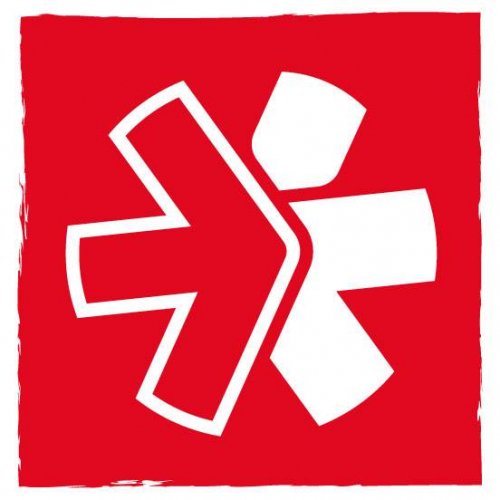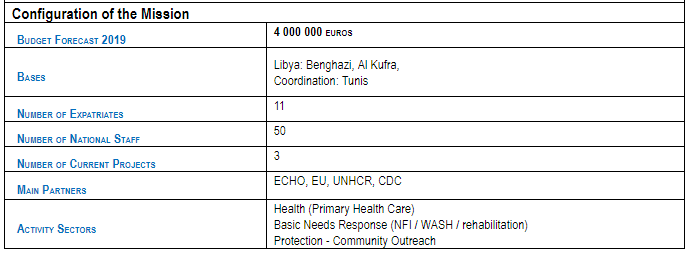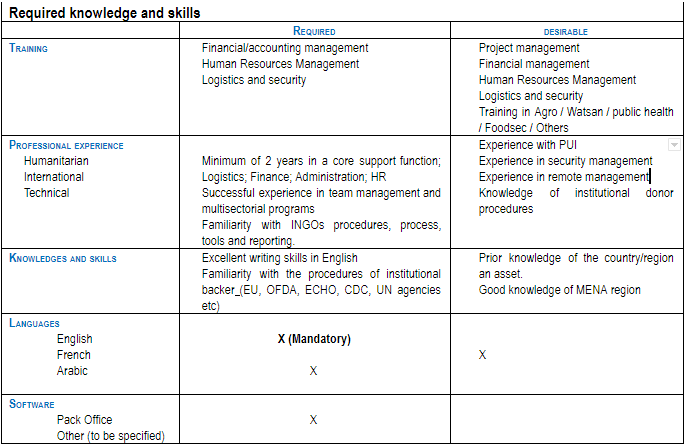Medical Coordinator – Premier Urgence Internationale عودة إلى الفرص
Première Urgence Internationale
يطلق Offre d'emploiانتهاء الصلاحية
31 جويلية 2020 Il y a 6 ans
شارك الفرصة على
تفاصيل الفرصة
General information on the mission:
| Context | ||||||||||||||
| Première Urgence Internationale (PUI) is a non-governmental, non-profit, non-political and non-religious international aid organization. Our teams are committed to supporting civilians’ victims of marginalization and exclusion, or hit by natural disasters, wars and economic collapses, by answering their fundamental needs. Our aim is to provide emergency relief to uprooted people in order to help them recover their dignity and regain self-sufficiency. The association leads on average 200 projects per year in the following sectors of intervention: food security, health, nutrition, construction and rehabilitation of infrastructures, water, sanitation, hygiene and economic recovery. PUI is providing assistance to around 7 million people in 21 countries – in Africa, Asia, Middle East, and Europe. PUI Libya mission started implementing operations in East (Benghazi and Alkufra) of Libya in 2017. The organization develop a lifesaving response that provides primary health care services to the most vulnerable population (internal displaced populations and their host communities, migrants, refugees and asylum seekers) combined with an integrated basic needs response to address the overall health situation of the PoC in detention centers and in urban settings.
General Context : Libya, a mostly desert and oil-rich country with an ancient history, has more recently been known for the 42-year rule of the mercurial Colonel Muammar Gaddafi – and the chaos that has followed his departure (BBC, 2019). The country has splintered, and since 2014 has been divided into competing political and military factions based in Tripoli and the east. Among the key leaders are Prime Minister Fayez Sarraj, head of the internationally-recognised government in Tripoli, Khalifa Haftar; leader of the Libyan National Army, which controls much of eastern Libya; Aghela Saleh, speaker of the House of Representatives based in the eastern city of Tobruk; and Khaled Mishri, the elected head of the High State Council in Tripoli. Islamic State group briefly took advantage of the conflict to seize control of several coastal cities including Sirte, which it held until mid-2017. It retains a presence in the desert interior (BBC, 2019). Humanitarian consequences: Seven years of instability and insecurity have taken their toll on the wellbeing of many children, women and men in Libya. Each passing year people struggle to withstand the impacts of the crisis that has destabilized the country, put them in harm’s way, driven up food prices, and ravaged the economy. To date, the crisis in Libya is characterised by violations of international humanitarian and human rights law, restricted access to safety and freedom of movement, forced displacement, severity and pervasiveness of gender-based violence. All parties to the conflict have committed breaches of international law including torture, unlawful killings, indiscriminate attacks, abductions, kidnapping, disappearances and the forceful displacement of people. The number of people with mental health and psychosocial problems increased substantially as a result of the conflict, including severe psychological distress for the conflict affected population, as well as the contamination from explosive hazards affecting human security and access (Protection Working Group, 2018). Approximately half of the people in need of humanitarian assistance are Libyans. Conflict affected refugees and migrants in or transiting through the country make up the other half. The majority of people in need are found in highly populated urban areas in the Western and Eastern regions of Libya. However, people with the most critical and severe needs are located in the southern mantikas2 of Murzuq, Sebha and Alkufra, and the coastal mantika of Sirt (HNO, 2019). An estimated 823,000 people, including around 248,000 children, are in-need of humanitarian assistance in Libya as a result of persisting political instability, conflict and insecurity, the breakdown of the rule of law, a deteriorating public sector and a dysfunctional economy. People in-need of assistance include internally displaced persons, returnees, non-displaced conflict affected people and host communities, and refugees1 and migrants (HRP, 2019). Benghazi In late 2017, suffering from armed combats for several years, Benghazi area was hosting about 45.000 internally displaced people (IDP) coming from different areas in Libya, and 147.000 returnees. Benghazi appears to be, with Tripoli, one of the two main cities to host the more IDPs. Otherwise, while the political situation in Libya remains tumultuous, new patterns of displacement are occurring, with a growing trend of returns reported in the East, and especially in Benghazi. Benghazi and its surroundings appear to be particularly vulnerable locations due to the high damage inflicted by three years of heavy clashes. The tensions between the Tebu and the Zway tribes seriously affects the health system and the access to basic services. Tribe communities, when they are a minority in the area, are suffering from segregation in most of Al kufra’s institutions, including health care facilities. This occurs in a context of underdevelopment and poverty that exacerbates the impact of the conflict on the population in the region. Indeed, this area has been suffering, even before the conflict, from a poor investment from the central government. However, few information are available on this area and its humanitarian needs due to a poor, if not almost inexistent, presence of NGOs.
|
| Job Description |
| Overall objective |
The Deputy Field Coordinator – Support is in charge to oversee the quality and efficiency of the support services at Benghazi base level. In coordination with FC he/she will ensure:
|
| Tasks and responsibilities |
| Support departments oversight: He/she provides oversight of all PUI Benghazi base support functions (Logistics, Administration, Finance, Human Resources) and ensures smooth, coordinated operations, finding synergies and improvements where possible.
loigistic monitoring: He/she ensures that current logistics procedures follow PUI standards and formats, and are in accordance with donor rules and regulations, overseeing and implementing an effective and efficient supply chain. He/She guarantees that PUI’s procedures and logistical tools are in place and are respected. administrative and financial monitoring: He/she ensures that current administrative and financial procedures follow PUI standards and formats, and are in accordance with donor rules and regulations; and ensures compliance with relevant procedures, with substantive support from the national coordination. Additionally, he/she support in overseeing all aspects related to finance and cash flow management in the bases, including budgetary and accounting elements. human resources: He/She supervises in coordination with FC and HR Officer the on-site activities related to administrative and human resource management, ensure the respect of the procedures and HR management tools in the bases in accordance with labor law regulations in Libya and HR policies of PUI. coordination: He/she compile, centralizes and report, in coordination with Finance & Admin Manager to FC and Admin Coordination team regarding all financial, administrative, legal and human resources matters on the base in Libya. Additionally, ensures the consolidation, in coordination with Logistic Base Manager (LBM), of all logistics information to share it with FC and at coordination level. capacity building: He/she ensures a technical support to Admin/Fin/HR/LOG teams in the base. He/she provides on regular basis technical trainings, and technical advises on their daily management in order to increase capacities of the teams. |
Specific objectives and related activities
|
|
|
|
|
|
Required Profile:
Required Personal Characteristics (fitting into team, suitability for the job and assignment/mission)
|
انتهت صلوحية الفرصة
للأسف هذه الفرصة لم تعد موجودة على جمعيتي . زوروا بانتظام قسم الفرص لتجنب افلات الفرص اللاحقة
للاتصال
تابع "جمعيتي" على لينكد إن
احصلوا على جمعيتي موبايل من الآن

عرض شغل منشور على "جمعيتي" في 6 juillet 2020
إكتشف المزيد من الفرص على "جمعيتي" عبر النّقر على هذا الرّابط.






